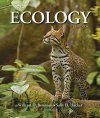About this book
Ecology is an easy-to-read and well-organized text for instructors and students to explore the basics and promote ecological literacy. Ecology, sixth edition, introduces readers to the beauty of nature and the importance of ecology and provides content in a way that engages students without overwhelming them in the process. The authors motivate students with an engaging case study conceptual approach that highlights relevant applications and data-driven examples.
Contents
Chapter 1 The Web of Life
Unit 1 Organisms and Their Environment
Chapter 2 The Physical Environment
Chapter 3 The Biosphere
Chapter 4 Coping with Environmental Variation: Temperature and Water
Chapter 5 Coping with Environmental Variation: Energy
Unit 2 Evolutionary Ecology
Chapter 6 Evolution and Ecology
Chapter 7 Life History
Chapter 8 Behavioral Ecology
Unit 3 Populations
Chapter 9 Population Distribution and Abundance
Chapter 10 Population Dynamics
Chapter 11 Population Growth and Regulation
Unit 4 Species Interactions
Chapter 12 Predation
Chapter 13 Parasitism
Chapter 14 Competition
Chapter 15 Mutualism and Commensalism
Unit 5 Communities
Chapter 16 The Nature of Communities
Chapter 17 Change in Communities
Chapter 18 Biogeography
Chapter 19 Species Diversity in Communities
Unit 6 Ecosystems
Chapter 20 Production
Chapter 21 Energy Flow and Food Webs
Chapter 22 Nutrient Supply and Cycling
Unit 7 Applied and Large-Scale Ecology
Chapter 23 Conservation Biology
Chapter 24 Landscape Ecology and Ecosystem Management
Chapter 25 Global Ecology
Customer Reviews
Biography
William D. Bowman is a Professor Emeritus at the University of Colorado at Boulder, affiliated with the Department of Ecology and Evolutionary Biology, Mountain Research Station, and the Institute of Arctic and Alpine Research. He earned his PhD from Duke University. Dr Bowman has taught courses in introductory ecology, plant ecology, plant-soil interactions, and ecosystems ecology, and for over three decades he directed undergraduate summer field courses and research programs. His research focuses on the intersections of physiological ecology, community dynamics, and ecosystem function, particularly in the context of environmental change.
Sally D. Hacker is a Professor at Oregon State University, Corvallis, where she has been a faculty member since 2004. She has taught courses in introductory ecology, community ecology, and marine biology. She is particularly interested in promoting active and experiential learning for students interested in ecology and field experiences. Dr Hacker's research explores the structure, function, and services of natural and managed ecosystems under varying contexts of species interactions and global change. She has conducted research with plants and animals in rocky intertidal, estuarine, and coastal dune ecosystems. Her work has most recently focused on the protective role of coastal ecosystems in mitigating the vulnerability from climate change.



































